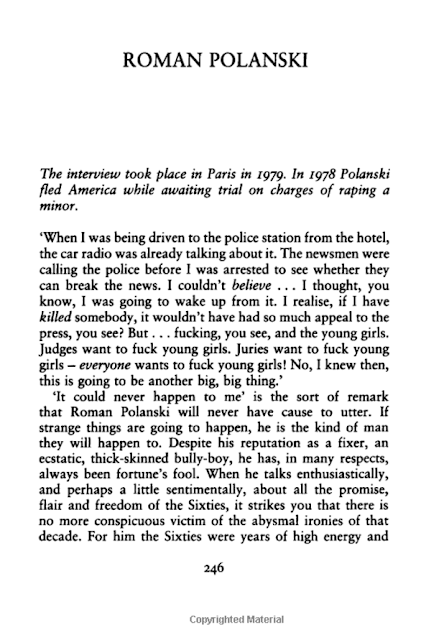"The first thing a man will do for his ideals is lie."
— Joseph A. Schumpeter, 'History of Economic Analysis (New York: Oxford University Press, 1954)', p. 43n
"In the flaring parks, in the taverns, in the hushed academies,
your murmur will applaud the wisdom of a thousand quacks.
For theirs is the kingdom."
— Kenneth Fearing, from his poem 'Conclusion'
In previous posts, I wrote about some of the problems with Sam Harris's attacks on Donald Trump — in particular, Harris's attempt to pretend that his denunciations did not amount to an ad hominem fallacy, but rather were somehow a useful comparison between Donald Trump and Hillary Clinton —
http://maxautonomy.blogspot.com/2016/11/the-sam-harris-fail.html
http://maxautonomy.blogspot.com/2016/11/goodbye-sam-harris.html
http://maxautonomy.blogspot.com/2016/12/sam-harris-left-out-tears.html
Here is a post from one of Sam Harris's readers at
the 'General Discussion' forum at Sam Harris's website, describing a supposed value in the use of the ad hominem fallacy. It almost seems as if Sam Harris was channeling this reader's thoughts in his denunciations of Donald Trump, since Harris seemed to count more on the trust of his followers than on making a convincing case to those who did not already agree with him —
https://www.samharris.org/forum/viewthread/68551/
https://archive.is/VyQdU
Posted: 23 August 2016 11:35
I have been thinking lately about the possible value of ad-hominem argumentation. The use of ad-hominem argument is often taken to be a sign of irrationality. However, I tend to think that behaviors, institutions, etc. generally arise for a reason. Virtually everyone uses ad-hominem argument at times and I do not think the strategy would have been so universally adopted if it was irrational to adopt it.
Ad-hominem is certainly a logical fallacy so it is an example of a case where our actual behavior diverges from the rule of logic but that does not necessarily make it irrational. I think the use of ad-hominem argumentation is rational in a world where we have very limited access to information. Let’s say I want to form an opinion about the best policy to pursue in Syria. How would I go about making an informed decision about Syria?
Well, I could go to Syria myself and gather information. I could spend years interviewing the people, travelling the country, etc. but this would be extremely time consuming and there would still be information that I would not have access to (I would almost certainly not be invited to listen in on conversations between Assad and the members of his regime, for example).
I could also read books on the subject but here I run into a problem. If I travel to Syria myself I know I can trust the information I gather because I can trust my own eyes but when I am reading a book how do I know that the information I am getting is accurate? I cannot compare it to the original. When deciding what books to read (or articles) and what books to dismiss I need to make some decisions about who is trustworthy and who is not.
The same applies on a forum like this. People often make posts on a forum like this where they provide information that I have no easy way of checking for its accuracy. So, I need to make some decisions about who to trust, what information to accept, what information to treat as suspicious, and what information to dismiss entirely.
I think I probably follow lots of semi-conscious and unconscious rules when making a decision like this. If people seem very belligerent in expressing their views, or they cling intensely to one side of the political spectrum, I tend not to trust them. If someone has a subtle view that is not easily categorized I am more likely to trust them. Tone is quite important here.
However, another way I can reach a decision is: if someone who I already trust attacks the trustworthiness of someone I have not made a decision about yet (i.e. they make an ad-hominem argument). Absent any other information, this seems to me to be a perfectly reasonable way to decide who to trust.
I think “logical knock-down arguments” generally fail to sway us on their own because whether an argument is “logical” or not is not the most important question we face when attempting to reach a decision about something. The most important question we face is: Can I trust the information I am getting? and the personal characteristics of the person presenting the information absolutely is relevant to that question.
This is why the best way to win an argument is not to provide some knock-down argument but to convince people that the person you are arguing with is not trustworthy (and any signs that a person gives off that they are trustworthy or untrustworthy is generally more important to me than the content of their argument). So, unless we can find another solution to this problem, (i.e. an objective way to determine what information we should trust), I think ad-hominem is here to stay, and I think it serves a necessary function.
Thoughts?
Notice the absurd contradiction in the forum post quoted above — the author of this post writes that it can be useful for one to use a distracting, flawed form of argument (i.e. a fallacy) to convince others that
an opponent is untrustworthy.
Only
ignorant or untrustworthy people are manipulated or swayed, never mind
convinced, by fallacies. If you witnessed someone you initially trusted using
any fallacy in an argument, why would you continue to trust them, and why would you expect them to be at all convincing
to anyone else who had no experience with them?
Given that Sam Harris does not refrain from arguing this way, when it suits him, it should not be surprising to find this kind of perverse logic in a discussion post on Sam Harris's website. Obviously,
no writer, including Harris,
is responsible for the ignorance (or wisdom) of his readers. But if arguing without resorting to the use of fallacy is not one of a writer's principle concerns, then it should not be surprising that it is not a principle concern for that writer's core audience. The post quoted above is a good example of the kind of like-mindedness one finds in approving followers — indeed, being like-minded is one of the main motivators for following anyone.
Obviously, being like-minded with another, in itself, is value neutral — it is not
necessarily a denigration, since the value of a belief, if any, depends on its content (like the content of the belief that fallacy is useful). And, of course, some will read bad writers as an exercise in studying illogic and destructive cultural trends (i.e. writers are often read precisely because they are
bad (
see my critical posts on Paul Krugman, for example)).
Also, notice the example used by the forum post author — the
action to pursue in a foreign nation's civil war (i.e. Syria), which, by necessity, requires the use of
forced tax collections. The author of the post makes an excellent case for why such foreign policy actions are usually a fools errand in practical terms, and have a track record of some level of failure (Vietnam, Iraq, Afghanistan, etc.), given that it can be impossible to get the information required to determine if
any course of action has even
a remote possibility of being helpful. People who have no access to even a substantial portion of the relevant information (which is to say, everyone not in the country and involved directly (and even most of them)) obviously have no chance of making an informed decision, and the use of fallacy from an individual that they admire (but probably should not), will not make their decision informed — it just adds another fallacy to the mix, the
'appeal to authority'.
And, again, the author of the post is making the recommendation to consider the value of
distracting and irrelevant statements — that is, a personal attack (i.e. an ad hominem) that does not bear on the position under consideration, as some kind of aid in sorting it all out, to help deal with
a lack of information.
The much more serious
moral issue of invading a foreign country to intervene
in a civil war, using the
forced tax collections from citizens who have no stake in the outcome (other than the vague hope that any
innocents can escape harm), is not mentioned by the author of the post . The supposed
'value' of a fallacious argument —
even if you agree with that questionable premise — is a trivial absurdity by comparison.
The unstated implication of this
terrible example is very telling too, since it also fits perfectly with statements Sam Harris has made, which take it for granted that the state has complete freedom to dispose of the lives and labor of its citizens.
Like this example from
Sam Harris's podcast from October 26, 2016 —
. . .
Sam Harris: "... To take the point I just raised about the progress of technology, clearly, at a certain point, once we arrive at the actual end of human drudgery — I mean, when you have, when you have, self-driving cars, and not only is there no need for ape-driven cars, you would have to be irresponsible to let an ape drive a car, because they are so much worse at it, right? It'll be illegal to drive your own car, and it should be, because right now, 30,000 people, or 35,000 people die every year reliably, because of how bad we are at driving cars. So, at a certain point, the machines are going to steal jobs that aren't coming back, and we have to break this connection, this, this, pseudo-ethical connection between work and having a claim on your own survival in society, right? So the idea that if you don't work, you shouldn't be able to eat, which is where a lot of people, you know ironically, a lot of the people who would vote for Trump, or who will vote for Trump, are people who look across the way at, you know, their shiftless neighbor and think, if you don't work for it, you don't deserve anything. I don't want any of my tax dollars going to support your shiftless lifestyle. Well, at a certain point, I mean, it's an understandable way of thinking, but at a certain point, we will arrive in a world where, again, only if we play our cards right, we'll arrive in a world where there is so much wealth, and so much automation of boring jobs, that there will not be enough productive things to do, and we'll be left with just creative and fun things to do, and people will still have to be paid for that."
Andrew Sullivan: "No, the trouble is that not everybody is capable of being creative."
Sam Harris: "Right. So you need a universal basic income, or you need something that, you need a safety net that get's better and better and better the more wealth gets created.
. . .
Notice how Sam Harris drops the critical issue in his choice of words regarding a 'universal basic income' — that a third party decision-maker must
initiate force to provide
unearned income to one person at the expense of another. And who gets to decide who works and who doesn't, and how long do you think it will take for a
Stalin or
Pol Pot like figure to take the job of deciding, and do you think society will be more, or less productive when everyone is promised an income
from someone else, even if they do not work? With an endless stream of scandals and human rights violations emanating from world governments, giving governments
even more power is still the only recommendation that many people will make regarding improving the human condition.
And, of course, there is no
'pseudo-ethical connection between work and having a claim on your own survival in society'. There is a
very real ethical connection between your supposed desire to help people, and your willingness
to initiate force against others to do so — the ethical connection is that an
initiation of force makes you immoral. The critical point is not, as Sam Harris seems to think, that the principle ethical issue regarding work is that you support yourself — that is conditional (if you are able to work, it is your responsibility). The critical point is that you do not use a political process
to force others to work for you, so that if you do not,
or cannot, support yourself, you must rely on charity from others for your support — that is, you must rely on the free choice of others.
Some people may
'look across the way at, their shiftless neighbor and think, if you don't work for it, you don't deserve anything', as Sam Harris put it, though it is just as likely that they think
'others do not deserve what I worked for, unless I willingly give it to them.
That is, this is a choice for the individual who worked to produce the wealth, and not those individuals who may want to steal it (it is theft, if it was not given by choice, regardless of the intent) — or, as in Sam Harris's case, the individuals who wish to engage in moral preening by pretending their demand for an initiation of force is what is helping others, rather than the productivity of those individuals whose wealth they plan to steal.
Sam Harris's statement in the quote above is the essence of why society is so divided — at least half of the people (or perhaps many more) think that they are justified in subjugating others for any goal that has even the vaguest hint of supposedly being
compassionate. The mythical Trump supporter Harris denigrates is not the problem for wanting to be left alone, or perhaps for wanting to help only those who
they feel deserve their help (how dare they) — the problem is all of the dishonest people who think, like Sam Harris, that the individual lives of an entire society are their play thing, and that they are free to dispose of them to satisfy their moral pretensions.
In the forum post quoted previously, the same pattern is displayed — the more important moral issue of initiating force to support an intervention in a foreign civil war is simply ignored, as if it has long since been settled and is not worth
even being questioned.
Oh, but let us discuss the supposed value of
our chosen authority making insulting comments as a way of making those who disagree with their position look
untrustworthy. ... sigh ...
In closing, here is a portion of Ayn Rand's essay
'Collectivized Ethics' — I repeat this often, since it is so applicable to this repetitious pattern of ignoring individual rights in people's attempt to grasp at pretending they are a social benefactor
--
https://www.youtube.com/watch?v=2OvL1_89QDs
http://www.aynrand.org/novels/virtue-of-selfishness
...
Since nature does not guarantee automatic security, success and survival to any human being, it is only the dictatorial presumptuousness
and the moral cannibalism of the altruist-collectivist code that permits a man to suppose (or idly to daydream) that he can somehow
guarantee such security to some men at the expense of others.
If a man speculates on what “society” should do for the poor, he accepts thereby the collectivist premise that men’s lives belong to society and
that he, as a member of society, has the right to dispose of them, to set their goals or to plan the “distribution” of their efforts.
This is the psychological confession implied in such questions and in many issues of the same kind.
At best, it reveals a man’s psycho-epistemological chaos; it reveals a fallacy which may be termed “the fallacy of the frozen abstraction” and
which consists of substituting some one particular concrete for the wider abstract class to which it belongs—in this case, substituting a specific
ethics (altruism) for the wider abstraction of “ethics.” Thus, a man may reject the theory of altruism and assert that he has accepted a
rational code—but, failing to integrate his ideas, he continues unthinkingly to approach ethical questions in terms established by altruism.
More often, however, that psychological confession reveals a deeper evil: it reveals the enormity of the extent to which altruism erodes men’s capacity
to grasp the concept of rights or the value of an individual life; it reveals a mind from which the reality of a human being has been wiped out.
Humility and presumptuousness are always two sides of the same premise, and always share the task of filling the space vacated by self-esteem
in a collectivized mentality. The man who is willing to serve as the means to the ends of others, will necessarily regard others as the
means to his ends. The more neurotic he is or the more conscientious in the practice of altruism (and these two aspects of his
psychology will act reciprocally to reinforce each other), the more he will tend to devise schemes “for the good of mankind” or of “society”
or of “the public” or of “future generations” —or of anything except actual human beings.
Hence the appalling recklessness with which men propose, discuss and accept “humanitarian” projects which are to be imposed by political means,
that is, by force, on an unlimited number of human beings. If, according to collectivist caricatures, the greedy rich indulged in
profligate material luxury, on the premise of “price no object”—then the social progress brought by today’s collectivized mentalities consists
of indulging in altruistic political planning, on the premise of “human lives no object.”
The hallmark of such mentalities is the advocacy of some grand scale public goal, without regard to context, costs or means.
Out of context, such a goal can usually be shown to be desirable; it has to be public, because the costs are not
to be earned, but to be expropriated; and a dense patch of venomous fog has to shroud the issue of means—because the means are to
be human lives.
“Medicare” is an example of such a project. “Isn’t it desirable that the aged should have medical care in times of illness?” its advocates clamor.
Considered out of context, the answer would be: yes, it is desirable. Who would have a reason to say no? And it is at this point
that the mental processes of a collectivized brain are cut off; the rest is fog. Only the desire remains in his sight—it’s the good,
isn’t it?—it’s not for myself, it’s for others, it’s for the public, for a helpless, ailing public ... The fog hides such facts as the enslavement and,
therefore, the destruction of medical science, the regimentation and disintegration of all medical practice, and the sacrifice of the professional
integrity, the freedom, the careers, the ambitions, the achievements, the happiness, the lives of the very men who are to provide that
“desirable” goal—the doctors.
After centuries of civilization, most men—with the exception of criminals—have learned that the above mental attitude is neither practical
nor moral in their private lives and may not be applied to the achievement of their private goals. There would be no controversy about
the moral character of some young hoodlum who declared: “Isn’t it desirable to have a yacht, to live in a penthouse and to drink champagne?”—and
stubbornly refused to consider the fact that he had robbed a bank and killed two guards to achieve that “desirable” goal.
There is no moral difference between these two examples; the number of beneficiaries does not change the nature of the action, it merely increases
the number of victims. In fact, the private hoodlum has a slight edge of moral superiority: he has no power to devastate an entire nation and
his victims are not legally disarmed.
It is men’s views of their public or political existence that the collectivized ethics of altruism has protected from the march of civilization
and has preserved as a reservoir, a wildlife sanctuary, ruled by the mores of prehistorical savagery. If men have grasped some faint
glimmer of respect for individual rights in their private dealings with one another, that glimmer vanishes when they turn to public issues—and
what leaps into the political arena is a caveman who can’t conceive of any reason why the tribe may not bash in the skull of any individual
if it so desires.
...






